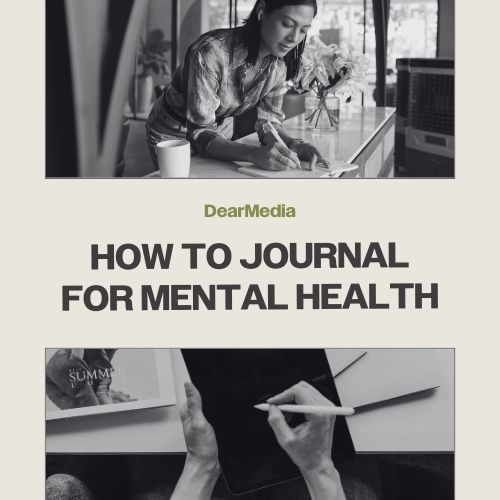How to Journal for Mental Health

We talk about mental health a lot around here, from ways to improve your mental health to the top mental health podcasts, because we truly understand its importance. The condition of your mental health can significantly impact your overall wellness, so make sure you give your mind the TLC it deserves! The good news is there are plenty of ways you can boost your mental health, which is exactly what we’re going to talk about today. You ready?

How to Journal for Mental Health
So, you might be wondering ‘What’s so special about journaling anyway?’ We get it. We shared the same thought. But, after we listened to the gals of What We Said chat in the episode, “Dream Life Unlocked,” we got to thinkin’ (and immediately ordered a ‘My Dream Life’ journal of our own). We were totally inspired, leading us to put together this post. We saw the importance of understanding what journaling is, and we want to share the right strategies to help you get started. This will make a huge difference in how you appreciate journaling and its ability to boost mental health. So, let’s get into it!
What Is Journaling?
Whether you’re writing with a pen and paper (maybe in this cute ‘Slay Era’ journal) or typing in a Google Doc, writing down your thoughts and feelings is a great way to pay closer attention to your overall mental health. Even if you haven’t been diagnosed with one or more mental health conditions, any kind of journaling from diary writing to gratitude journaling is a great way to focus on personal growth. Not sold just yet? Listen to Les Alfred, the host of She’s So Lucky (fka Balanced Black Girl), give you all the deets in her episodes “The Journaling Practice That Changed My Life” and “How to Start Journaling & Benefits of Having a Journaling Practice.”
Really though, journaling is a powerful tool for improving your mental well-being. Journaling can immediately improve your mood by forcing you to confront any negative emotion that might be weighing you down, making it easier to process emotions, gain clarity, and foster a sense of control in your life.
And, if you’re not totally sold, there are a bunch of great podcast episodes on this topic worth listening to! Some great ones include:
- Transform: “How to Have Self-Compassion & Self Love“
- Him & Her: “How To Build Your Confidence & Trust Your Gut”
- Him & Her: “Execute On Your Dreams Ft. Face Foundrie Founder, Michele Henry“

Why Is Journaling Good for Mental Health?
Think journaling is just scribbling down thoughts? Think again! It’s a fun, creative way to boost your mental health. Some key benefits include:
- Stress reduction
- Emotional awareness
- Improved mood
- Enhanced problem-solving skills
- Increased self-confidence
- Better sleep
- Healing and emotional release
How to Journal Effectively for Mental Health?
Set goals and stick to them.
Goals are like this season’s hottest accessory—a must-have! Before you start jotting down whatever’s on your mind, try to think about what you hope to get out of journaling. Maybe you’re working on managing anxiety or improving positive self-talk and overcoming negative thoughts. Or, maybe you’re simply creating a habit of self-reflection. No matter what your goals are, cling on to them and use them to keep you motivated and focused.
Create a comfortable journaling space.
Go ahead and get comfy, babe! You’re more likely to want to journal and get in the right headspace if you feel good physically, too. So, choose a quiet, comfortable spot where you can focus without distractions. If possible, you can dedicate a space just for journaling, whether it’s a cozy corner in your home, a spot in your favorite park, or even a table at your local coffee shop. This way, you’ll automatically be in the mood once you get settled, and both your mind and body will feel more zen!
Set aside time each day for journaling.
We’ve all heard the cliché that consistency is key. When you’re focusing on improving your mental health, every bit helps when it comes to optimizing the benefits of journaling. We found that deciding on a specific time each day to write in a journal, whether it’s in the morning to set your intentions or at night to reflect on your day, makes a big difference. Even if it’s just 10-15 minutes, make a point to write every day!
Be sure to read our story “Why is Routine Important for Mental Health” for more on this topic!
Just write.
Stop overthinking it! Seriously! Don’t worry about grammar, spelling, or how your writing looks. Try to think less and write more! Easier said than done, we know, but the goal is to express yourself authentically so let your thoughts flow naturally and don’t censor your feelings.
Or, you can use prompts to get started.
If you’re unsure what to write about, use journaling prompts to guide you. Sure, they might seem a little corny at first, but they can help so much, and there are tons of great writing prompts to be found online.
Some great examples of journal prompts for mental health include:
- “What am I feeling right now? Why?”
- “What things am I grateful for today?”
- “What challenges did I face today? How did I handle each challenge?”
For more encouraging journaling prompts, tune in to this episode of The Dream Bigger Podcast all about journaling!

Experiment with different journaling styles.
Journaling doesn’t look the same for everyone, and it definitely doesn’t have to look the same every day. Try different journaling styles to find what resonates with you. That could mean:
- Gratitude Journaling: Focus on what you’re thankful for
- Bullet Journaling: Use short phrases and lists for a structured format
- Stream-of-Consciousness: Write without stopping or editing
- Art Journaling: Incorporate doodles, drawings, or collages
Occasionally reflect on past entries.
Every now and then, take time to look back on past entries. This can help you identify patterns, recognize progress, and gain insights into your mental and emotional health. Plus, seeing how far you’ve come will inspire you to keep on journaling!
Be kind to yourself.
Remember, journaling is personal, so there’s no “right” way to do it. If you miss a day or don’t feel like writing, that’s okay! Treat yourself with compassion and start again when you’re ready.
Speaking of being kind to yourself, be sure to listen to this episode of The Squeeze: “You Are Worthy.”
What to Write in a Journal for Mental Health?
Not sure where to start? We’ve got you! Grab a pen and your trustee journal and pick a prompt below.
- Express your feelings.
- Share something you’re grateful for.
- Write a letter to someone.
- Identify coping mechanisms.
- Identify and track goals.
- Talk about your fears and how you can overcome them.
- Recount your day.
- Jot down your goals and how you can achieve them.
- What’s making you anxious? Let it all out!
- Describe yourself to a stranger.
- Discuss your biggest life challenge.
- Reflect on your progress.
- Revisit your first memory.
- Write a stream of consciousness.
- Define your purpose in life.
- Write a letter to yourself.
- Explore your dreams.
Make your mental health a priority and start journaling today.
Journaling is just one of many ways you can make your mental health a priority, which can greatly impact your overall well-being. Give it a try today and let us know how it works for you. Or, if you’ve already been journaling for some time, share your experience with others in the comments below.
Or, if you have someone in your life struggling with their mental health, buy them a journal or some of these other gifts that support mental health.
And, as always, browse the Dear Media show guide for some of the latest and greatest podcasts, as well as the blog for more super helpful content.




















Leave a Reply